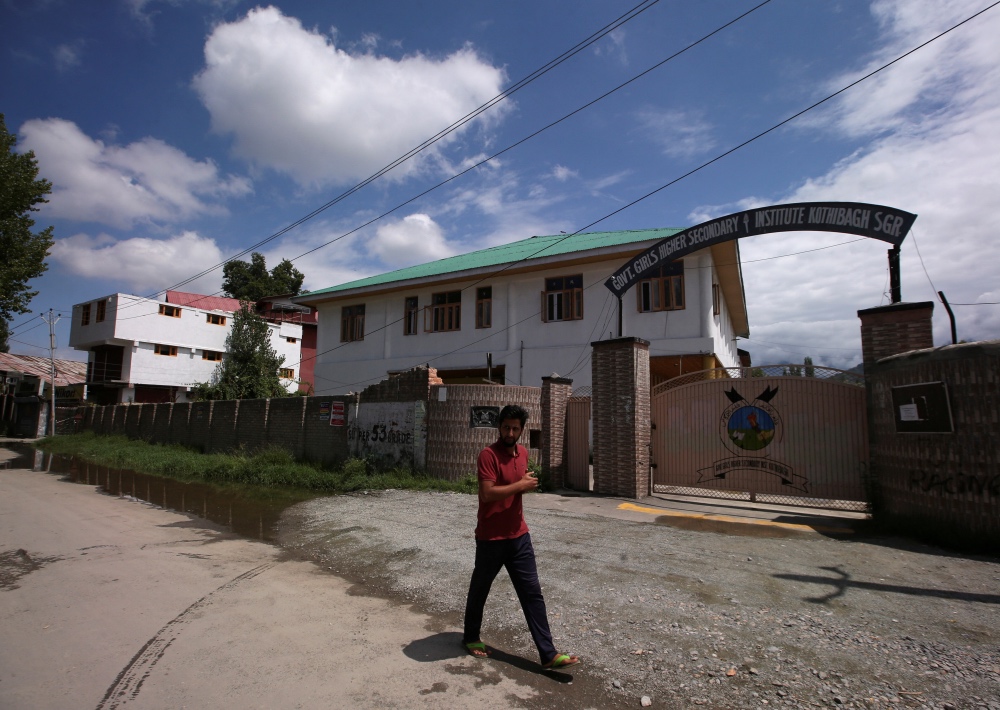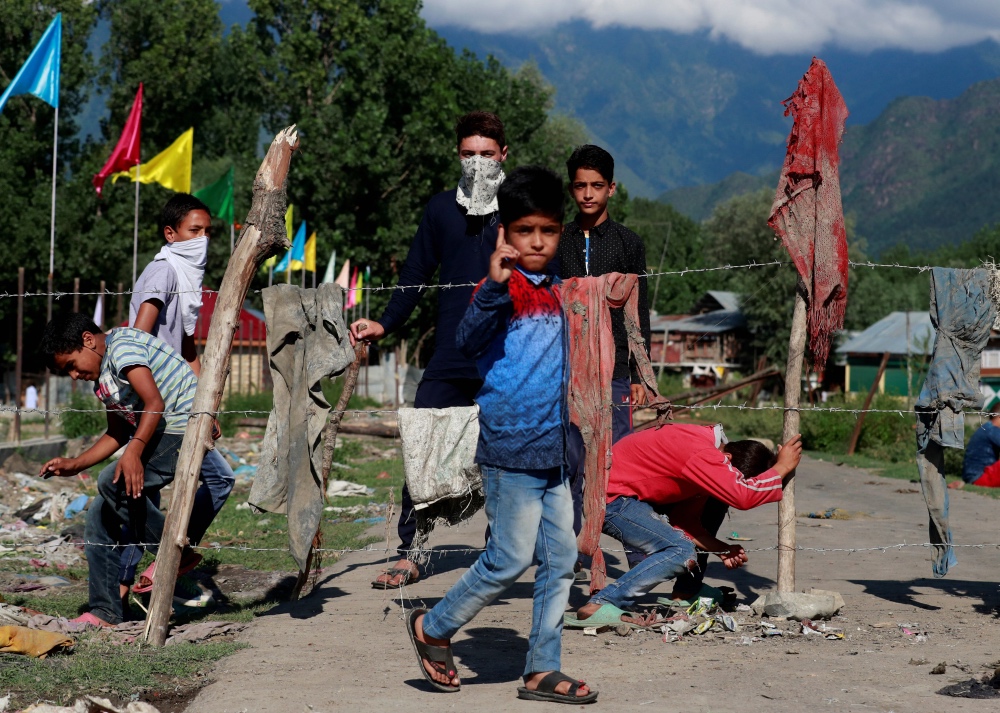Srinigar, India
Reuters
Schools reopened in Indian Kashmir’s main city on Monday but most classrooms were empty as parents kept their children home, fearing unrest over the government’s decision two weeks ago to revoke the region’s autonomy.
About 200 primary schools were set to open in Srinagar in a sign of normality returning to Muslim majority Jammu and Kashmir where authorities started to ease restrictions on movement last week.

A Kashmiri man walks past a school, during restrictions after the scrapping of the special constitutional status for Kashmir by the government, in Srinagar, on 19th August. PICTURE: Reuters/Danish Ismail
In Shopian, in the militant hotbed of south Kashmir, a dozen schools were open on Monday but attendance was zero, Kashmir’s director for school education Younis Malik said.
Parents said their children would stay home until cellular networks are restored and they can be in contact with them.
“How can we risk the lives of our children?” said Gulzar Ahmad, a father of two children enrolled in a school in the city’s Batamaloo district where protests have occurred.
“Troops have arrested minor children in the last two weeks and several children were injured in clashes,” he said. “Our children are safe inside their homes. If they go to school, who can guarantee their safety?”
Authorities have previously denied reports of mass arrests.
Srinagar’s top administrative officer, Shahid Iqbal Choudhary, said on Sunday that adequate security would be provided for schools. “I will take responsibility for any untoward incident,” he added.
Protests began after the 5th August decision by Prime Minister Narendra Modi’s government to withdraw Kashmir’s special status and integrate it fully into India, with equal rights for all Indians to buy property there and compete for government jobs.
Critics said the decision alienated many Kashmiris and would add fuel to a 30-year armed revolt in the Himalayan territory that Pakistan also claims.
Paramilitary police in riot gear and carrying assault rifles stood behind steel barricades and coils of razor wire in Srinagar’s old quarter to deter any repeat of weekend protests.
In dense neighbourhoods such as Batamaloo, youths set up makeshift barricades to block security forces from entering. In Teilbal in south-eastern Srinagar, a Reuters witness saw large rocks, logs, and barbed wire strung across a road leading into the area.
Authorities reimposed curbs on movement in parts of Srinagar on Sunday after overnight clashes between residents and police in which dozens were injured, two senior officials and witnesses said.
The movement restrictions were relaxed in parts of Srinagar on Monday, with substantial traffic on some major thoroughfares. Armed paramilitary remained deployed, though their distribution in many areas was thinner than in preceding weeks.
On Monday evening, scores of people strolled along the banks of the picturesque Dal Lake, a popular tourist destination ringed by Himalayan mountains.
At Srinagar’s civil secretariat, the centre of the state’s administration system, 98 per cent of staff were in attendance on Monday, government spokeswoman Syed Sehrish Asgar told a press briefing.
But a state government official who asked not to be named said only 1,830 of the secretariat’s more than 3,800 staff had actually come in.
Reuters journalists visited two dozen schools in Srinagar on Monday. Some schools were lightly staffed and classrooms deserted. Gates at other schools were locked.
Only one student showed up at Presentation Convent Higher Secondary School, which has an enrolment of 1,000 pupils, and went home, said a school official.
There were no students at the barricaded Burn Hall school in one of the city’s high security zones.
“How can students come to classes in such a volatile situation? The government is turning these little children into cannon fodder,” a teacher said, among a handful of staff who turned up for work.
New Delhi’s decision on Kashmir has heightened tensions with its neighbour and rival nuclear power, Pakistan, and triggered cross-border exchanges of fire.

Kashmiri protesters stand at a barricade to block the entrance of a neighbourhood, during restrictions after the scrapping of the special constitutional status for Kashmir by the government, in Srinagar, on 19th August. PICTURE: Reuters/Danish Ismail
In the latest incident, two civilians were killed in Pakistan-controlled Kashmir by Indian soldiers firing across the border, Pakistan’s foreign ministry said, adding that it had summoned India’s deputy commissioner in Islamabad to protest.
There was no immediate comment from India which has previously accused Pakistan of trying to whip up tensions to draw global attention.
Pakistan’s Foreign Minister Shah Mehmood Qureshi said at a press conference late on Monday that Pakistan’s Prime Minister Imran Khan had discussed the Kashmir situation on a call with US President Donald Trump and called on him and America to “play a role in resolving the current crises.”
Separately, India said Modi also spoke with Trump on Monday. It said Modi had stressed to Trump the importance of creating a regional environment free from terror that eschews cross-border terrorism without exception.
Last month, Trump touched off a storm in India after he said Modi had asked him if he would mediate on Kashmir. India denied ever asking for such assistance. India has long bristled at any suggestion of third-party involvement in tackling the Kashmir issue.
Indian Defence Minister Rajnath Singh said on Sunday there would be no talks with Pakistan until it acted against anti-India militant groups operating from its soil.
Pakistan has in the past denied the allegation and says it only gives moral and diplomatic support to the Kashmiri people in their struggle for self determination.
The scenic mountain region is divided between India, which rules the populous Kashmir Valley and the Hindu-dominated region around Jammu city, Pakistan, which controls a wedge of territory in the west, and China, which holds a thinly populated high-altitude area in the north.
– additional reporting by Saad Sayeed in Islamabad, Pakistan.






